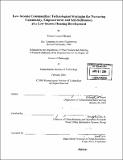| dc.contributor.advisor | Joseph Ferreira, Jr. | en_US |
| dc.contributor.author | O'Bryant, Richard Louis, 1964- | en_US |
| dc.contributor.other | Massachusetts Institute of Technology. Dept. of Urban Studies and Planning. | en_US |
| dc.coverage.spatial | n-us-ma | en_US |
| dc.date.accessioned | 2005-09-06T20:46:47Z | |
| dc.date.available | 2005-09-06T20:46:47Z | |
| dc.date.copyright | 2003 | en_US |
| dc.date.issued | 2004 | en_US |
| dc.identifier.uri | http://hdl.handle.net/1721.1/26910 | |
| dc.description | Thesis (Ph. D.)--Massachusetts Institute of Technology, Dept. of Urban Studies and Planning, February 2004. | en_US |
| dc.description | Includes bibliographical references (p. 214-230). | en_US |
| dc.description.abstract | There are a number of historically familiar and unfamiliar forces at work in low-income communities in the United States. Recurrent forces include rapidly changing economic and demographic trends, Welfare Reform, and the increasing demand for affordable housing and a living wage. This thesis, through research-based exploration and observations of a particular information technology transfer project, considers a relatively contemporary concern known as the Digital Divide (U.S. Department of Commerce, 1995, 1997, 1999 & 2000) and examines the impacts that IT may have on low-income residents' ability to address their own challenges. This thesis uses data collected from a two-year longitudinal study, which we called the Camfield Estates-MIT Creating Community Connections Project, in order to address the following question(s): Can personal computing and high-speed Internet access support community building efforts; and can this access to technology empower low-income community residents to do more themselves? We gain insight into the likelihood that residents who have a personal computer and Internet access in their homes will feel a sense of community, will experience an increase in their social contact with others, and will strengthen their social ties. This research also explores whether outcomes gained through in-home computing can promote an increased sense of empowerment and the capacity to independently access relevant information related to a resident's needs, wants or purposes. Camfield Estates is a small, low- to moderate-income, housing development in Roxbury, Massachusetts with significant historical ties to its surrounding community. | en_US |
| dc.description.abstract | (cont.) Camfield's residents and its leaders' developmental successes and difficulties provided a unique opportunity to observe the effects of in-home computing on project participants' ability to communicate with other participants, fellow residents and family and friends outside of the Camfield community. Thirty-seven participating households received a free computer and training with 20 completing follow-up interviews. The majority of participating households were single parent, African-American and Hispanic female-headed households with related children under 18 years of age. Results indicated significant computer and Internet use and some positive correlation between frequency of in-home computing/internet use and participants feeling a part of the Camfield community. There was no evidence that in-home computer use led to family and/or social isolation. In-home computing complemented by the local neighborhood technology center (NTC) was frequently used for activities consistent with a sense of empowerment and self- sufficiency goals. Despite the initiative's overall costs (hardware, software, training, Internet service and technical support), in-home computing appears to add a valuable dimension beyond the local NTC. Taking advantage of changing technology, improved web services, and opportunities for integration with other social services are likely to increase the potential value of in-home computing and reduce the cost and technical expertise required for future projects of this kind. | en_US |
| dc.description.statementofresponsibility | by Richard Louis O'Bryant. | en_US |
| dc.format.extent | 300 p. | en_US |
| dc.format.extent | 17985606 bytes | |
| dc.format.extent | 18025592 bytes | |
| dc.format.mimetype | application/pdf | |
| dc.format.mimetype | application/pdf | |
| dc.language.iso | en_US | |
| dc.publisher | Massachusetts Institute of Technology | en_US |
| dc.rights | M.I.T. theses are protected by copyright. They may be viewed from this source for any purpose, but reproduction or distribution in any format is prohibited without written permission. See provided URL for inquiries about permission. | en_US |
| dc.rights.uri | http://dspace.mit.edu/handle/1721.1/7582 | |
| dc.subject | Urban Studies and Planning. | en_US |
| dc.title | Low-income communities : technological strategies for nurturing community, empowerment and self-sufficiency at a low-income housing development | en_US |
| dc.type | Thesis | en_US |
| dc.description.degree | Ph.D. | en_US |
| dc.contributor.department | Massachusetts Institute of Technology. Department of Urban Studies and Planning | |
| dc.identifier.oclc | 55694398 | en_US |
